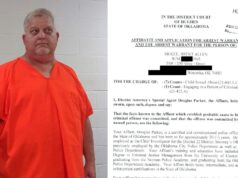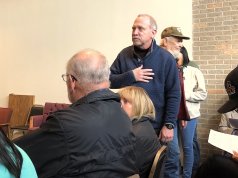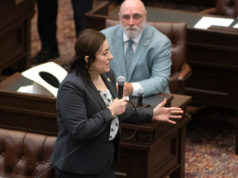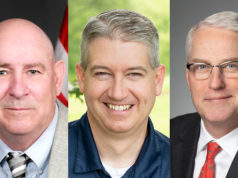An Oklahoma City Muslim man is reliving the fear of being stopped by law enforcement officers because he says his name has been on a federal terrorist watchlist since 2012 with no explanation.
Saadiq Long, 52, said he has been subject to traffic stops five times since late November — once at gunpoint — by Oklahoma City Police Department officers, one of whom told him his status on the federal terrorist watchlist was part of the reason for the stops. Long filed a federal lawsuit Wednesday seeking an injunction and compensation.
In an interview with NonDoc ahead of a press conference this morning, Long said his vehicle has been searched and that he has been interrogated, handcuffed twice and arrested at gunpoint in the last two months. Long said none of the OKCPD officers have seemed to be aware of the prior stops, but each incident became more intense.
The most recent traffic stop, which occurred Jan. 12 on Interstate 40, resulted in eight OKCPD cruisers pulling him over and ordering him at gunpoint to get out of the car, where he was handcuffed and put in a cruiser while officers looked inside his vehicle.
“I thought they were going to shoot me as I was approaching them,” Long said. “I thought they were going to make my wife a widow.”
Adam Soltani, executive director of the Oklahoma chapter of the Council on American-Islamic Relations, said his organization sent a cease-and-desist order to the OKCPD on Jan. 13. Long has not been stopped since.
“I was shocked that this is happening to not just a citizen of our state and our country, but an American Muslim who has faced years of civil rights violations and challenges, and not to mention a Black American Muslim who had survived the legacy of his ancestors being enslaved in this country,” Soltani said. “At a time when we’re trying to highlight those wrongs that were done, he’s facing continued injustice at the hands of our law enforcement system.”
Long, through his attorneys, CAIR Oklahoma and the CAIR Legal Defense Fund, filed a lawsuit Wednesday in the U.S. District Court for the Western District of Oklahoma. His petition (embedded below) seeks an injunction against OKCPD to prohibit the department’s officers from initiating traffic stops, making arrests or conducting searches that require reasonable suspicion or more based on an individual’s inclusion on the federal terrorist watchlist.
Named in the lawsuit are OKCPD Chief Wade Gourley and 17 police officers, most of whose names are unknown. The lawsuit also seeks compensatory and punitive damages and attorneys’ fees.
OKCPD Msgt. Gary Knight said it would be “inappropriate” for the department to comment on the lawsuit. NonDoc also requested copies of the police reports for Long’s traffic stops, but none were provided prior to publication.
Long said he believes OKCPD officers are aware of his whereabouts through automated license plate readers, high-speed and computer-controlled camera systems installed throughout the city. The cameras track certain categories of a license plate number. Long said he believes the system informs police officers that he is on the federal terrorist watch list, which officers consider a reasonable suspicion to make a traffic stop.
The traffic stops have occurred after he drove by one of the cameras, usually on his drive to work, Long said. He has driven the same car with the same license plate for several years, and, while he said he has been followed by police occasionally, he was never pulled over until late November.
Long said he is a law-abiding citizen and has never been arrested, indicted, tried or convicted of a violent offense. Soltani questioned the timing of the traffic stops.
“He’s an active member of the Muslim community, attending Friday prayers at the mosque every week,” Soltani said. “He’s a normal American citizen doing normal American things, so where did this come from? Why is it happening now?”
Saadiq Long placed on federal no-fly list around 2012
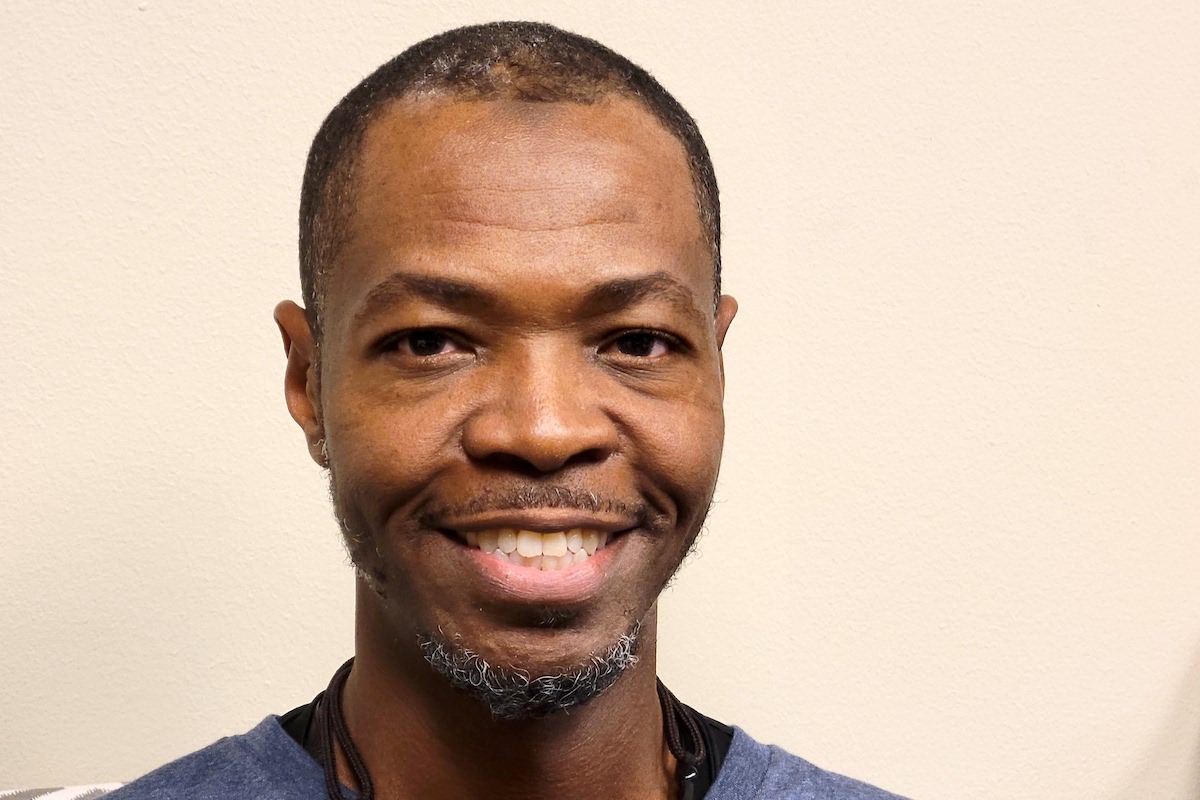
It was 10 years ago when Long, a McAlester native and an Air Force veteran, experienced a myriad of problems trying to fly home from the Middle East to visit his ailing mother in Oklahoma. At the time, he lived in Qatar and taught English. When he attempted to board his flight, he was told the U.S. Department of Homeland Security had placed him on its no-fly list, which barred him from flying into his own country.
After several delays, he was able to board a flight in November 2012, but he was interrogated at length by federal agents at stops in Amsterdam and in Detroit on his way to Oklahoma.
Once Long arrived in McAlester, he said he and his sister were followed by the FBI and had several unexpected and unwanted encounters with agents. FBI agents came to his mother’s home, and his family also noticed they were being followed on more than one occasion.
Ten weeks later, in February 2013, Long tried to fly back to Qatar but was told he couldn’t board the airliner. He tried twice to board a flight out of OKC’s Will Rogers World Airport and was turned away at the gate. He again had been placed on the no-fly list. He eventually made it to Qatar, but he had to take a bus from Oklahoma City to Mexico and then board flights in three different countries.
Long sued the federal government, saying his unexplained placement on the no-fly list and the federal terrorist watchlist violated his constitutional and statutory rights. In response, the federal government removed him from the no-fly list in 2020, which ended his no-fly list-related claims. While he is no longer on the no-fly list, Long said he remains on the federal terrorist watchlist.
Long, who returned with his family to Oklahoma in 2015, said he has no idea why he was placed on the no-fly list and the terrorist watchlist. The federal government, he said, never provided him with any explanation for its actions.
His new lawsuit states the FBI develops and maintains the federal government’s consolidated Terrorism Screening Database. Long’s petition claims the FBI accepts almost every single person nominated to its list — submitted by anyone — because the FBI uses a standard so low that any person can be made to qualify based on a string of speculative inferences.
The terrorism list includes more than 1 million names, almost all of them Muslim, and is based in broad profiles that cast suspicion on entire categories of people without any reasonable suspicions for why a person should be stopped, according to the lawsuit. Individuals may be added for a variety of reasons that fall short of establishing reasonable suspicion of criminal activity, such as being an immediate relative, friend, colleague or fellow community member of an individual on the list.
“Terrorist watchlist status does not create reasonable suspicion of ongoing criminal activity because placement on the watchlist does not require reasonable suspicion of any crime,” the lawsuit states.
The FBI, according to the lawsuit, shares records from the terrorist watchlist to the National Crime Information Center database, which allows law enforcement agencies with access to the NCIC database to see that Long is on the FBI’s list, but none of the underlying information for that placement.
Kayla McCleery, a spokeswoman for the FBI Oklahoma City office, provided a statement regarding Long’s situation.
“The FBI is aware of the allegations, however we cannot confirm or deny the potential existence of a federal investigation,” McCleery said. “As a general rule, the FBI has the authority to conduct an investigation when it has reasonable grounds to believe that an individual has engaged in criminal activity or is planning to do so. This authority is based solely on the illegal activity, not on any constitutionally protected activity, and we take great care in distinguishing between the two.”
Cascade of traffic stops
In the past two months, Long said he has been pulled over by OKCPD officers five times. In addition to considering the stops to be harassment, Long said the incidents occurred on the sides of busy roads and were dangerous.
According to Long, the five stops have taken place:
- Nov. 23, just north of Northwest 39th Street at sunset. An OKCPD officer informed Long that he exceeded the 40-mph speed limit by driving 46 mph. While he waited in his car for 45 minutes after handing over his driver’s license and insurance information, Long said the officer contacted the FBI. The officer returned and issued him a speeding ticket.
- Dec. 19, on Portland Avenue just north of Reno Avenue at about 6 p.m. An OKCPD officer informed Long that he had taken his left turn too widely and had crossed into the right lane without signaling. The officer gave him a warning.
- Dec. 30, on Lake Hefner Parkway just south of the Hefner Road on-ramp about midnight. Two OKCPD officers told him he was being pulled over because Long’s car was listed under the name of a gang member. Long said he was told to remain in his vehicle and when the officers returned 20 minutes later, one of them told him that his license plate check alerted them that his vehicle was under suspicion of being on a terrorist watchlist. Long’s documents were returned and he was told he was free to go.
- Jan. 4, on Lake Hefner Parkway just south of the Hefner on-ramp about midnight. Two OKCPD officers told him he was being stopped for going past the stop line, which is considered blocking an intersection. Long said he had been stopped recently several times and had provided information, such as his telephone number and where he worked, and he said he didn’t want to give the information again. As a result, Long was told to get out of his vehicle and was handcuffed and searched. Officers issued him a ticket for blocking an intersection.
- Jan. 12 on Interstate 40 eastbound just past Sooner Road about 1 p.m. At least eight OKCPD police vehicles followed him for about 10 miles before he was pulled over and ordered to get out of his vehicle with his hands up. Several officers had their guns drawn and aimed at Long. He walked backwards toward the officers as instructed and then was told to kneel down and place his hands behind his back. He was handcuffed and placed in the back of a police vehicle. He was told he had been pulled over because he was driving a vehicle that had been reported stolen. Long said he has owned the same vehicle with the same license plate for several years. While he was in the police vehicle, five officers with their guns drawn went to his vehicle, opened its doors and looked inside. He was released from the handcuffs, let out of the police vehicle a few minutes later and told he was free to go.
Long said he believes all the traffic stops were made because his name was on the federal terrorist watchlist. He said that, in the most recent stop, officers lacked the authority to search his vehicle because they lacked probable cause that it contained contraband or any criminal evidence.
“It was a waste of everyone’s time and resources,” he said.
Soltani, the CAIR Oklahoma director, said OKCPD’s treatment of Saadiq Long has deteriorated confidence in the department among Muslims in the area.
“This is to the detriment of relations between Oklahoma City police and the Muslim community and, generally speaking, law enforcement in Oklahoma and the Muslim community,” Soltani said. “We understand as a minority group the importance of having positive relationships with local law enforcement because there have been attacks on Muslims, hate crimes against mosques and things of that nature.
“This makes me concerned all the progress that we’ve made in trying to build lines of communication and good working relationships will be soured because of this.”
Saadiq Long federal lawsuit petition
https://nondoc.com/wp-content/uploads/2023/01/Saadiq-Long-Complaint-with-CM-ECF-Stamp.pdf” viewer=”google”]









